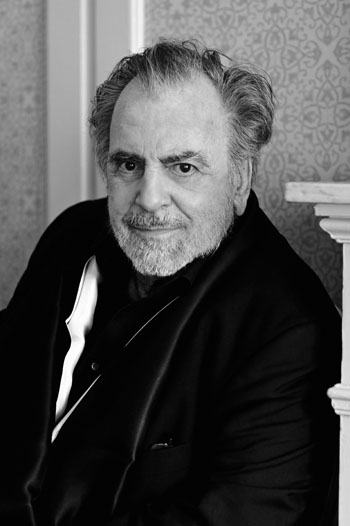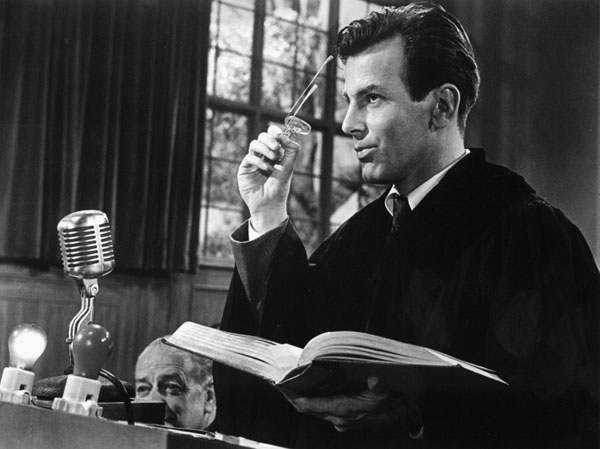German news agencies are reporting that Maximilian Schell died last night in a clinic in Innsbruck following a sudden and severe illness. Schell, born in Vienna as the son of a Swiss poet, novelist, playwright and an actress, was 83.
In his 1955 film debut, Schell co-starred with Klaus Kinski in László Benedek’s anti-war drama Children, Mother, and the General (Kinder, Mütter und ein General). He would appear in seven more European films before making the trek to Broadway (appearing in Ira Levin’s Interlock) and, eventually, Hollywood. The first film he appeared in there was another anti-war drama, Edward Dmytryk’s The Young Lions (1958), playing a disillusioned German officer.
Then came the international breakthrough. Having taken on the role of the defense attorney in a live TV Playhouse 90 production of Judgment at Nuremberg, he’d reprise it Stanley Kramer’s 1961 adaptation as part of a cast that included Spencer Tracy, Burt Lancaster, Richard Widmark, Marlene Dietrich, Judy Garland, Werner Klemperer and Montgomery Clift. Schell’s performance scored him a Best Actor Oscar (he’d be nominated twice again: Best Actor for Arthur Hiller’s The Man in the Glass Booth [1975] and Best Supporting Actor in Fred Zinnemann’s Julia [1977]).
In 1968, Schell began to write, produce, direct and star in his own films: an adaptation of Kafka‘s The Castle (1968), First Love (1970), based on a novel by Ivan Turgenev and nominated for an Oscar for Best Foreign Language Film—as was The Pedestrian (1974). A few more of his films need mentioning: End of the Game, a 1975 thriller with Jon Voigt and Jacqueline Bisset, Tales from the Vienna Woods (1979), and Marlene (1984), a documentary on Dietrich that was nominated for an Oscar and won awards in Germany and from the New York Film Critics Circle. In 2002, he made another documentary, this one much closer to his heart, My Sister Maria, a portrait of the actress succumbing to disease and death.
Updates, 2/2: In the Telegraph, Gaby Wood reminds us that Schell was also “a gifted pianist who made a series of TV programs about Beethoven with Leonard Bernstein [and] a director of operas who collaborated with Claudio Abbado. His German-language performance as Hamlet earned him comparisons to Laurence Olivier.”
“After decades of stardom, Mr. Schell evolved into an international character actor—distinguished, gray-bearded and perhaps a bit world-weary,” writes Anita Gates in the New York Times. “‘The world doesn’t change. The balance of evil will always be the same,’ he said in an interview with the New York Times in 2001, when he was preparing to appear on Broadway in Judgment of Nuremberg, this time as one of the accused Nazi judges (played by Burt Lancaster in the film). ‘I think all the poets and artists have always written for peace and love, and it hasn’t changed much in the last two or three thousand years. But we hope.'”
For the Guardian, Brian Baxter walks us through the career, performance by performance.
Update, 2/3: “What Schell had going for him was gravitas,” writes Noel Murray at the Dissolve. “He was a handsome man with sharp features, a toothy grin, and sunken eyes, yet rarely played romantic leads. Schell was more at home with historical figures, and as authoritarians with a mildly manic energy and a faintly tragic air. Even in genre films like Sam Peckinpah’s Cross of Iron and the Disney science-fiction adventure The Black Hole, Schell brought a dark, magnetic intensity.”
Phil Dyess-Nugent at the AV Club: “In 1986, Schell starred in the TV miniseries Peter the Great; two years later, he was nominated for an Emmy for his performance as Lenin in the HBO film Stalin, starring Robert Duvall. He revealed a sly sense of humor in Andrew Bergman’s 1990 comedy The Freshman, raised a family of hit men in James Gray’s Little Odessa (1995), sold James Woods out in John Carpenter’s Vampires (1998), sweated the end of the world in Deep Impact (1998), and in his last film role, played a legendary con man called Diamond Dog in Rian Johnson’s The Brothers Bloom (2008).”
“Schell was a friend of Plácido Domingo, and the tenor brought Schell to Southern California to direct two productions at L.A. Opera—Lohengrin in 2001 and Der Rosenkavalier in 2005.” In the Los Angeles Times, David Ng passes along a statement from Domingo: “When I think of Max, I particularly remember the friendly rivalry of the soccer matches we played in Salzburg during the festival. One summer, I even sprained my thumb making a goal; Max always claimed later that he had let me score.”
For news and tips throughout the day every day, follow @KeyframeDaily on Twitter and/or the RSS feed. Get Keyframe Daily in your inbox by signing in at fandor.com/daily.





